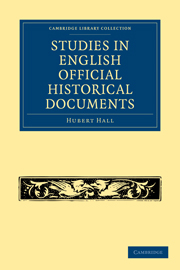Book contents
- Frontmatter
- PREFACE
- Contents
- ERRATA
- PART I THE SOURCES OF OFFICIAL HISTORICAL DOCUMENTS
- PART II THE DIPLOMATIC OF OFFICIAL HISTORICAL DOCUMENTS
- INTRODUCTION TO THE DIPLOMATIC STUDY OF OFFICIAL DOCUMENTS
- THE ANGLO-SAXON CHARTERS
- ANGLO-NORMAN CHARTERS AND WRITS
- LATER CHARTERS AND DIPLOMATIC INSTRUMENTS
- LETTERS, STATE PAPERS AND DEPARTMENTAL INSTRUMENTS
- ROYAL SURVEYS, INQUISITIONS AND ASSESSMENTS
- ROYAL ACCOUNTS
- JUDICIAL PROCEEDINGS
- APPENDIX I A Classified Table of Diplomatic Instruments
- APPENDIX II Early Diplomatic Criticism
- APPENDIX III The Charters of King Athelstan (Concordance of Formulas)
- APPENDIX IV Table showing the Relationship of the Pre-Conquest and Post-Conquest Diplomata
- APPENDIX V Documents connected with the Issue of the Great Seal (1662)
- APPENDIX VI Fees of the Seal
- APPENDIX VII Note on the Bibliography of English Diplomatic
- PART III THE PALAEOGRAPHY OF OFFICIAL DOCUMENTS
- TABLE OF MATTERS
- Frontmatter
- PREFACE
- Contents
- ERRATA
- PART I THE SOURCES OF OFFICIAL HISTORICAL DOCUMENTS
- PART II THE DIPLOMATIC OF OFFICIAL HISTORICAL DOCUMENTS
- INTRODUCTION TO THE DIPLOMATIC STUDY OF OFFICIAL DOCUMENTS
- THE ANGLO-SAXON CHARTERS
- ANGLO-NORMAN CHARTERS AND WRITS
- LATER CHARTERS AND DIPLOMATIC INSTRUMENTS
- LETTERS, STATE PAPERS AND DEPARTMENTAL INSTRUMENTS
- ROYAL SURVEYS, INQUISITIONS AND ASSESSMENTS
- ROYAL ACCOUNTS
- JUDICIAL PROCEEDINGS
- APPENDIX I A Classified Table of Diplomatic Instruments
- APPENDIX II Early Diplomatic Criticism
- APPENDIX III The Charters of King Athelstan (Concordance of Formulas)
- APPENDIX IV Table showing the Relationship of the Pre-Conquest and Post-Conquest Diplomata
- APPENDIX V Documents connected with the Issue of the Great Seal (1662)
- APPENDIX VI Fees of the Seal
- APPENDIX VII Note on the Bibliography of English Diplomatic
- PART III THE PALAEOGRAPHY OF OFFICIAL DOCUMENTS
- TABLE OF MATTERS
Summary
Judicial Records
Amongst the many legal terms that have passed into the vocabulary of mediaeval history, few are more familiar than the title which is somewhat indiscriminately bestowed on the more ancient Archives of the State.
In a legal sense, the “Record” has a purely technical significance, but as a conventional expression it stands for the purest sources of history. If we wish to know the meaning of the term in its legal aspect, we shall find a learned and indisputable definition in some ancient commentary. But if we ask the further question “when were judicial pleadings first recorded in this country, and what was their earliest form and object?” an answer will not be easily forthcoming.
It is true that, from one point of view, the earliest extant form of a judicial Record is seen in the royal charter which was admitted as an evidence of title and which even served as a medium for recording judicial pleadings. Several interesting reports of cases, which in a later period would have been duly recorded in the Plea Rolls, are imbedded in the texts of Anglo-Saxon and Anglo-Norman charters. Narratives of law-suits which remind us at one time of the famous pleadings on Pendon Heath, and at another time of the adventurous litigation of Richard de Anesti, have been preserved from the 8th century onwards, besides a considerable number of official writs, and a few inquisitions, licences and oblations.
- Type
- Chapter
- Information
- Studies in English Official Historical Documents , pp. 311 - 326Publisher: Cambridge University PressPrint publication year: 2010First published in: 1908



